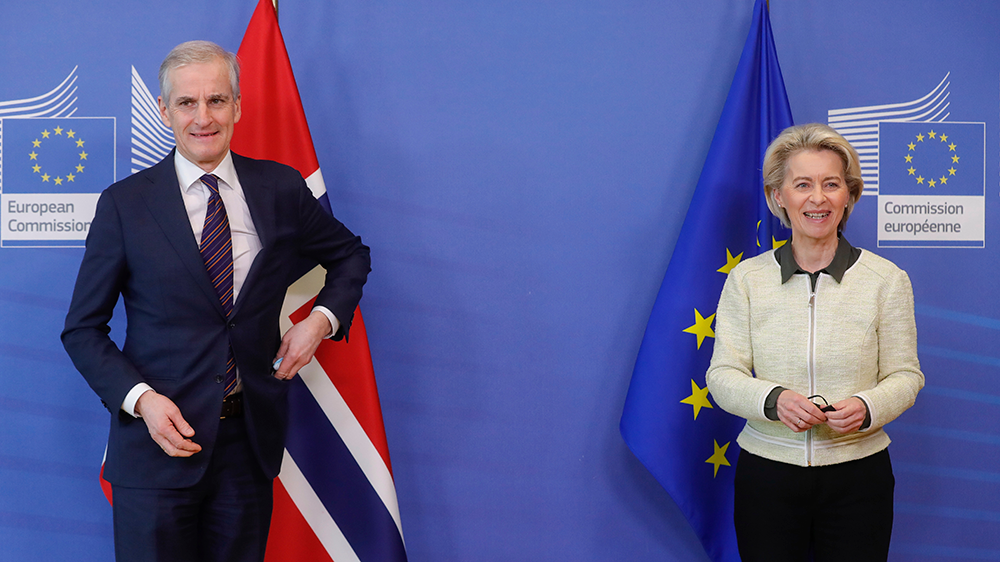"It is a persistent democratic problem that Norwegian citizens have no kind of influence over laws and regulations that come from the EU and apply in Norway," says political scientist Guri Rosén, who has been the secretary leader for a government-appointed EEA committee, delivering its recommendations on April 11.

Yes to EU rules: Norway passively accepts rules and directives from the EU, reveals new EEA study. Here, Prime Minister Jonas Gahr Støre visiting Brussels at the EU President Ursula von der Leyen in 2022. (Photo: NTB/ Scanpix)
This article is translated from Norwegian to English by UiOGPT
The committee, which has been led by department head at The United Federation of Trade Unions (Fellesforbundet) Line Eldring, concludes among other things that the EEA Agreement is not entirely adapted to today's EU. It is also pointed out that the lack of knowledge in Norway about how we are influenced by EU rules, almost without a public debate, is a democratic problem. The knowledge deficiency in Norway regarding both the EU and the EEA is highlighted as a weak point.
ARENA (Centre for European Studies) at the University of Oslo has served as the secretariat for the study. Secretary leader, Associate Professor at the Department of Political Science, Guri Rosén, has been closely involved in the entire process.
"What are the most important experiences from the EEA cooperation as it emerges in the report - over the past ten years - if you are to highlight at least three things?"
"Something I think is most important is that the EU looks completely different today than in 2012, when the previous study was delivered, not to mention 1994! The climate crisis, changes in global trade patterns and increased protectionism, experiences from the pandemic, and not least Russia's full-scale invasion of Ukraine, have contributed to a change of pace," says Rosén.
She also points out that geopolitics and security policy have become more important for the internal market.
The path forward more unpredictable
Industrial and business policy has gained a new impetus - alongside an increased focus on climate policy, according to Guri Rosén. The EU is to contribute to strengthening European competitiveness, but the instruments are changed.
"For example, the EU's trade policy is employed more actively to protect European businesses. Here, Norway will be treated as a third country, and there is a risk that different sets of rules may develop within the internal market. We have the EEA, but the path forward has become more unpredictable," she emphasizes.

The secretary leader points out that both Norwegian interests and international developments push us towards the EU.
"The EU does not compete with NATO for the responsibility for territorial military defense. At the same time, the EU has become a much clearer security policy actor. Particularly, the war in Ukraine has shown that the EU is capable of using a broad spectrum of tools, from weapons deliveries and sanctions, to economic support and protection of critical infrastructure," says Rosén.
"The study highlights that the EU's response is also in line with the message that Europe will need to take care of its own security in the future."
A third point the secretary leader emphasizes is that the 2012 study highlighted that the EEA provides a surplus in benefits, but a deficit in co-determination. This study shows that it is a balancing act that has become more difficult. European integration has become broader and deeper. That also means that Norway's democratic challenges have increased.
"Can it be said that the EEA Agreement has "served" Norway well? What are the strengths and weaknesses of the agreement?"
"Yes, it has served Norway well. The study shows that it has proven to be surprisingly robust and adaptable. The EU in 2024 is something completely different from the EU in 1994. The flexibility that is inherent in the agreement is a strength. To say it is a weakness is possibly going too far, but the institutional set-up of the agreement is not entirely adapted to today's EU," says Rosén.
"One example is that when Norway is to participate in EU agencies, it involves major adaptations. It requires political will to adapt the EEA to today's EU."
Rosén also points out what she calls an undeniable weakness; the lack of democratic anchoring.
"One can call it a pragmatic compromise, but the fact that Norwegian citizens have no form of influence over laws and regulations that emanate from the EU and apply in Norway is an ongoing democratic problem by all measures," says Rosén.
The Parliament is little involved, most people know little about the EEA, the media would prefer to write about the EU, and the result is a fragmented - and often not very knowledge-based - public debate. That is also a democratic problem.
"How important is the agreement for Norway?"
"That's a big question. It is the most comprehensive international agreement Norway has, and an agreement that is significant in a wide range of areas, not just economically. The study points out, among other things, that the EEA Agreement serves as a platform for developing cooperation in areas beyond the EEA, for example in foreign and security policy. At the same time, it offers no guarantees."
Recommends rethinking
"The committee has been tasked to address all relevant agreements Norway has with the EU, and to provide advice on how Norwegian interests can best be safeguarded. Are there suggestions for new agreements?"
"There are no suggestions for new agreements, but the committee emphasizes that the challenges Norway faces require rethinking both from Norwegian politicians and from the administration," says Rosén.
"Much of what is now happening at the EU level challenges the EEA Agreement, for example, what is happening within the EU's trade policy."
She emphasizes that this does not mean it is impossible to use the agreement to cooperate with the EU in these areas as well.
"But it will require that politicians are capable of viewing the developments happening in the EU holistically - and accordingly develop Norwegian strategies."
"The committee has also looked at the cooperation that the United Kingdom, Switzerland, and Canada have with the EU. What distinguishes them from EEA cooperation experiences, and what is common?"
"Here the study points to the unique aspects of the different agreements due to political, economic, and geographical considerations. Canada is quite some distance from the EU. The Swiss agreements have evolved over a long time and it is unlikely that they would receive the same agreements today. The United Kingdom is a former EU member, with all that entails," says Rosén.
"At the same time, it is important to remember that agreements between the EU, Canada, the United Kingdom, and Switzerland do not provide the same access to the internal market as the EEA Agreement."
No picking or choosing
If she were to point out common features, it is nevertheless that the EU-especially after Brexit-has become clearer that "cherry-picking" will not be accepted.
"It should not be possible for non-members to pick and choose what they say yes to. That really goes without saying. Why cooperate with someone who is only willing to accept arrangements that entail benefits for themselves?"
"What has it been like working on the study?"
"It has been very exciting and interesting. If I were to highlight any of the challenges, they would particularly be assessing how EEA cooperation is affected by the developments at the EU level, in a context where everything happens incredibly fast," says Rosén.
She refers to several updates and new legislative proposals that have been difficult to assess the consequences of, just within the period the committee has been working.
"At the same time, the committee did not want to be too retrospective, precisely because the EU is changing rapidly, says the secretary leader, who emphasizes that she believes they have found a good balance between evaluating the experiences over the past decade and discussing what it is reasonable to expect in the future."
Another challenge she highlights is the format.
"It is challenging to convey such technical and complex material in a way that the study becomes accessible to non-specialists. But that's what the mandate requested, and an element the committee has placed great emphasis on," says Guri Rosén.
A tidal wave of regulations
Daniel Naurin is the director of ARENA, which has hosted the secretariat for the EEA study. He stresses that the study reveals there is a great need for more knowledge about the EU and the EEA in Norway.
"A tidal wave of regulations from the EU floods in every year that Norway has to handle, but the understanding of where these regulations originate from, and how to manage them in the administration, industry, and society is far too low, he points out, noting that this leads to a backlog in rule compliance in Norway and uncertainty for companies and individuals about which rules apply."
"How important is this study?"
"Norway's relationship with Europe and the EU has been the most important political issue in Norway for the last 60 years. The study shows that the deeper cooperation within the EU over the past ten years makes the issue more urgent than ever. Hopefully, it can lead to renewed discussion and knowledge about what our relationship with the EU looks like and what we want for the future."
"How important has the research-based knowledge from ARENA been in this process?"
"We are happy and proud to have been the host for the secretariat of the study. ARENA's task is to be a leading knowledge center on the EU in Norway. The secretariat has worked entirely independently but has regularly asked for and received contributions from ARENA's researchers and other researchers throughout Norway and Europe."
"Does the study inspire further research on the EU?"
"The three areas the study points out as particularly important for Norway moving forward are also key research areas for ARENA: climate policy and the EU's Green Deal, the EU's foreign and security policy, and the development of the EU's new health union," says Daniel Naurin.






